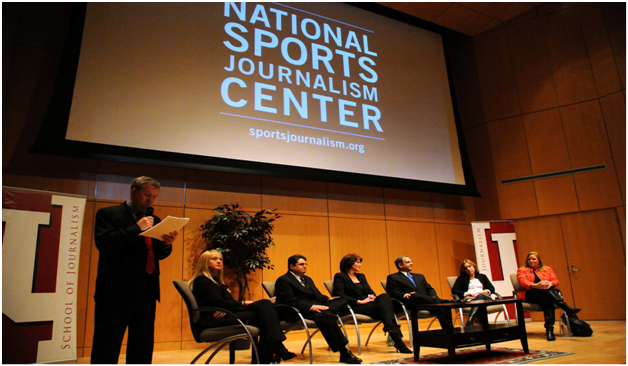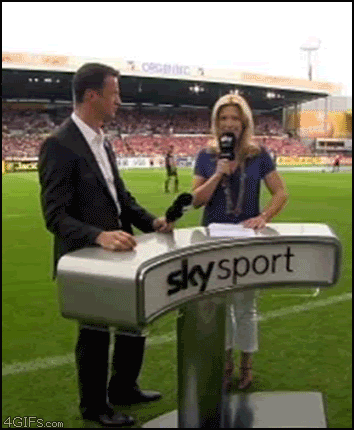
The New Republic senior editor Isaac Chotiner is not a sports journalist. That much is made clear—really, the only thing made clear—in his recent screed against sports journalists. If Chotiner were a sports journalist he might actually know what the hell he is writing about, but he isn’t and he doesn’t.
The premise of Chotiner’s argument is that there are two, and only two, types of “sports journalism.” The “serious journalism” kind covers “corruption, the business of sports, and illegal doping,” while the other consists of “post game press-conferences [sic] . . . mid-game interviews . . . and the endless number of predictions that makes sports fandom so fun.” For an argument that so definitively categorizes types of sports journalism, Chotiner’s distinction makes no sense and actually leaves out the bulk of what constitutes sports journalism.
Sports journalism is many things, but for the most part it doesn’t involve investigating corruption or attending press conferences. It mostly involves going to practices and games and then writing about what occurred. Sports reporters of course speak with athletes and coaches to supplement their stories as well as to gain a better understanding of what they are seeing, but their stories are fundamentally based upon the reporter observing something. It is especially puzzling that Chotiner leaves this out because it is seemingly the type of sports journalism he prefers. He references leaving the “analysis of the upcoming series to smarter people” and clearly enjoys the work of Zach Lowe…who is most known for his extremely long and in-depth columns that he bases on hours of film study and dozens of conversations with the people involved.
@AreYouAbell Do you read my stuff? I watch tape all the time.
— Zach Lowe (@ZachLowe_NBA) June 6, 2012
Chotiner also doesn’t seem to understand that even within his terribly flawed dichotomy the categories make very little sense. The people that conduct mid-game interviews are sideline reporters who are quasi-team employees. Who their audience is, their role and how they are paid is very different from a newspaper beat writer, for instance. Most people (including yours truly) draw a very strong distinction between broadcasters and reporters. It is also weird that Chotiner—in an opinion piece that consists of absolutely no real reporting—lumps predictions (a form of opinion writing) in with reporting. Is he also going to condemn New York Times national security reporters as not “real” journalists because of the presence of Maureen Dowd in the Times’ opinion section?
Not content with the entire premise of his article having no merit, Chotiner seeks to construct a straw man to set upon this nonexistent foundation. He brings up Gregg Popovich’s infamously infantile habit of responding to questions he thinks are dumb with a single word, and rather than condemn it Chotiner’s cheers it on, because “Popovich is not denigrating serious reporting.” Chotiner’s right, Popovich isn’t denigrating serious reporting; he’s denigrating people and making them cry. He then deigns to inform us that sports journalism is completely acceptable, but that sports reporters “shouldn’t pretend like they are performing some sport of public good” or “act as if it is part of some higher calling.”
Of course, Chotiner fails to share data or even a single example—you know, doing some “real” reporting—of a “sports journalist” (does anybody even refer to themselves as a “sports journalist”?) believing that their work is part of a higher calling. I’ve never experienced a sports reporter believing this, and I doubt Chotiner has either.
He is right that some journalism is more important to the public good than sports journalism, and I doubt he could find a sports reporter that would argue otherwise. In the words of Ball Don’t Lie contributor Dan Devine: “Thanks for clearing up that I’m not covering the Pentagon. I got confused mid-Kelly Kapowski joke.” But in managing to run smack dab into this tree, Chotiner doesn’t even realize he’s in a forest.
Press conferences and mid-game interviews can give us a lot of information. For instance, we found out from a press conference just the other day that the Pacers star player is conflicted about whether he wants the team to re-sign one of his talented teammates, a pretty unique reaction among NBA players. If Chotiner thinks press conferences and mid-game interviews lack “serious” journalism, the solution is not to laud one of the least cooperative interviewees in the NBA for his capriciously unhelpful responses, it is for all parties to treat them as serious, worthwhile endeavors. In a world where health journalists are fighting for increased access to government officials, the White House Correspondents Association is constantly fighting a photo ban and media reporters implore media executives to answer their calls, it’s almost traitorous for a fellow journalist to cheer on decreased access.
With few exceptions, the kind of “serious” reporting Chotiner prefers doesn’t generate enough revenue to justify its cost. Investigative reporting budgets are falling, and ever fewer reporters cover President Obama’s travels. This type of “serious” journalism has always been subsidized by entertainment, food & drink and, yes, sports coverage. Apple wants to put their iPod ads next to concert reviews, not reports of genocide in Africa. The latter is undoubtedly more important, but it doesn’t exist without the former. The “serious” journalism Chotiner prefers is paid for by the very reporting that he doesn’t understand and loathes.

There are numerous purposes of journalism, but one of the most basic is to provide information about the things that people are interested in. Guess what: people (including Chotiner) are interested in sports! They’re also interested in theater, music, games, beer and wine. People desire information about these things, and they rely on (and pay) journalists to gather it for them. If Chotiner has a problem with this, his problem is with society, not sports journalists.
The base assertion is absurd and insulting. In my Clark Kent job I am a health policy researcher, and I write papers that help inform and shape health care policy, which political reporters then write about. Does that give me the moral superiority and right to then lecture Chotiner about how what I do is more important than his job? After all, in some small way I’m actually creating policy; he’s just writing about it. Can both of us go to Chipotle and insult the guy making our burrito because what we do is more “serious” than him? Must all work strive towards a higher purpose: is there no virtue in work itself, no honor or value in working hard simply to provide food and shelter for your family?
“Sports journalists” fill a need that society has decided exists, and provide the information that helps make the day just a little bit more digestible for millions of people. Entertainment may not be as important of a need to fulfill as hunger or shelter, but that doesn’t mean it is unimportant. “Sports journalists” provide joy to people, and there is value in that.
As for Chotiner, to invert a frequent refrain: stick to politics.

